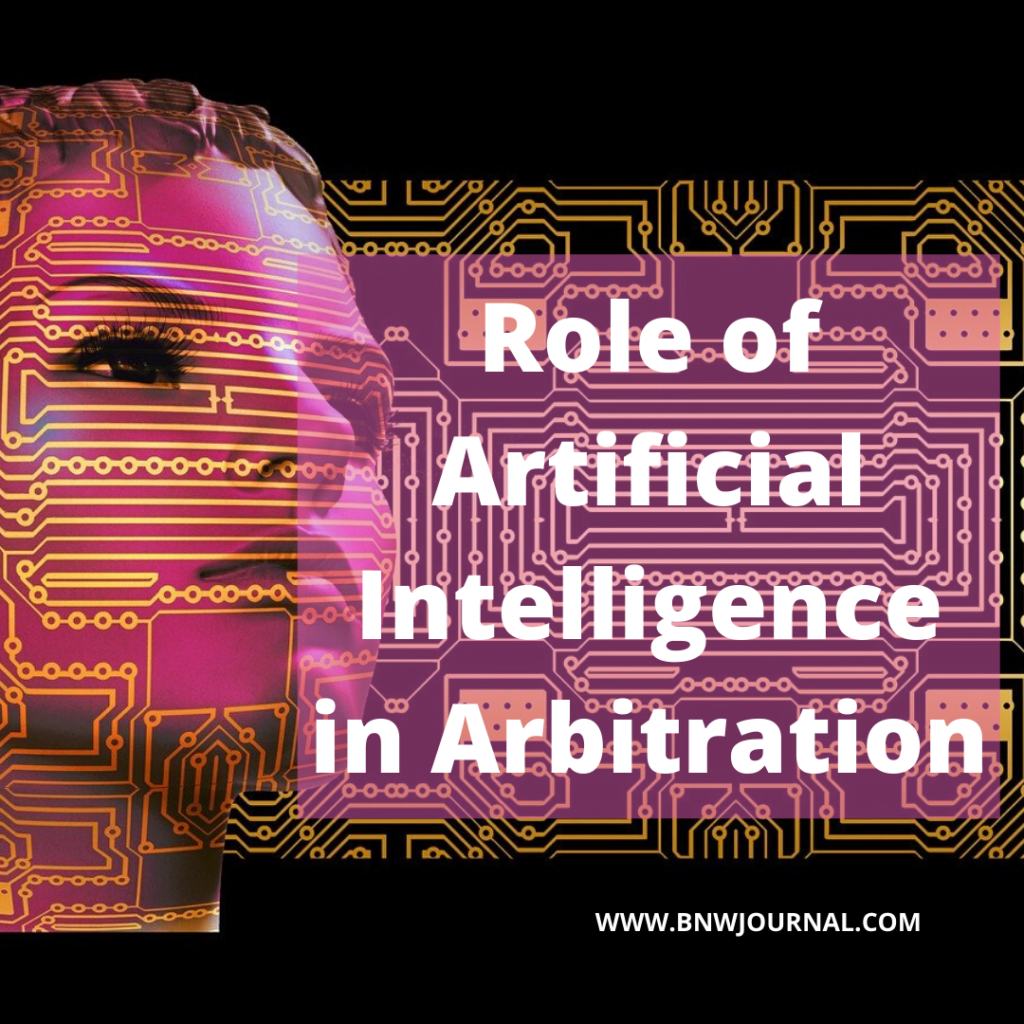![]()
INTRODUCTION
Artificial Intelligence is now a reality. With the advancement of technologies, the use of cryptocurrencies, blockchains, and smart contracts is not a new phenomenon in the legal industry. These advancements have already made their way to legal industry and it is making its way to alternative dispute resolution industry also. A pertinent question arises that does the arbitral framework permits the use of technologies. New technologies are touted to increase efficiency, reduce costs and permit the expansion of arbitration into market segments.[1] Artificial intelligence and online dispute resolution are the concepts that should be embraced. It is a field of computer science that includes machine learning, natural language processing, speech processing, expert systems, robotics and machine vision.[2]

The arbitration framework does not categorically rule out the use of technology in arbitral proceedings.
Article 19(1) of the UNCITRAL Model Law on International Commercial Arbitration states that “subject to the provisions of this Law, the parties are free to agree on the procedure to be follow by the arbitral tribunal in conducting proceedings”.[3] Also Article 19(2) states that “failing such agreement, the arbitral tribunal may, subject to the provisions of this Law, conduct the arbitration in such a manner as it considers appropriate”, and also has “the power to determine the admissibility, relevance, materiality and weight of any evidence”.[4]
Article 19.1 of the Singapore International Arbitration Centre Rules provides that “the tribunal shall conduct the arbitration in such manner as it considers appropriate, after consulting with the parties, to ensure the fair, expeditious, economical and final resolution of the dispute”[5] Similar provisions can be found in International Chamber of Commerce Rules.[6]
From these legislations and rules, we can understand that there is significant degree of freedom granted to arbitrators in establishing the fats of the case and also there is no restrictions on the means by which they may do so.
Chief Justice of India, Justice Bobde in the International Conference on ‘Arbitration in the Era of Globalisation’ organised by Indian Council of Arbitration and FICCI said that, “As we conceptualise international arbitration in a globalised era, we must also be cognisant of the synergistic opportunities available for international arbitration through utilisation of disruptive technologies”.[7]
Disputes resolutions through artificial intelligence mechanism is more accessible, easier, faster and less expensive to complete and it can improve the quality of the process. Arbitration laws do not restrict the appointment of a computer as an arbitrator.
A pertinent question which arises is whether the awards prepared using artificial intelligence and arbitral proceedings conducted using artificial intelligence be acceptable by the courts? There is no provision of appeal in arbitration. Awards cannot be challenged on merits of the case and there is no judicial review. Therefore, local courts can enforce and promote blockchain based arbitrations.[8]
CHALLENGES
There are many challenges that can be faced in arbitral proceedings conferred by artificial intelligence. One of the challenges faced is that of Confidentiality. Arbitral proceedings through technologies requires external assistance to operate the technologies. This might create confidentiality concerns. This can be overcome if the individuals with specific technical knowledge who are necessary for operating tech-powered tools should be required to sign confidentiality agreements.[9] The use of artificial intelligence will replace the lawyers.
The critics of online dispute resolution argue that dispute resolution processes cannot be adequately conducted online because “cyberspace is not a ‘mirror image’ of the physical world.[10] The lack of emotional processing in arbitral proceedings is a significant drawback for a machine arbitrator. Empathy is very critical in arbitral proceedings. It is very important that arbitrators put themselves in the shoes of the respective parties. When arbitrators think from the parties’ perspectives, then only they are ready to perceive the dispute and reach an award completely. Many of the legislations in international arbitration provides arbitrators to be a physical person. However, this is not pervasive. While some legislations explicitly provides that an arbitrator must be a physical person, others are silent on the matter.[11]
CONCLUSION
New technologies such as smart contracts, blockchains, and cryptocurrencies have made their way to the legal industry. These new technologies have the ability to impact and disrupt the arbitral proceedings in number of ways. AI can be suited for simple and smaller cases. Artificial intelligence is helpful in terms of cost effectiveness, time management, less paperwork etc. Artificial intelligence in arbitral proceedings is helpful in coronavirus outbreak, where parties cannot meet physically. Parties can meet virtually and arbitral proceedings can be conducted with the help of artificial intelligence. It is the right time for the stakeholders to adopt artificial intelligence based arbitration in this outbreak of COVID-19.
References:
[1] Gauthier vanniewenhuyse, “Arbitration and New Technologies: Mutual Benefits”, 35 J. INTL.ARB. (2018), pg 119.
[2] Paul Stohard,Mathew Plaistowe,Cara Dowling, “Jargon Buster”Legal Technology, Norton Rose Fulbright, October 2017, https://www.nortonrosefulbright.com/en-gb/knowledge/publications/94c4c379/jargon-buster-legal-technology.
[3] UNCITRAL Model Law on International Commercial Arbitration, 1985, With amendments as adopted in 2006, Article 19(1).
[4] Ibid.
[5] Arbitartion Rules of the Singapore International Arbitration Centre, 2016, Article 19.1.
[6] Rules of Arbitration of the International Chamber of Commerce Rules, 2012, Art. 25(1).
[7] Artificial Intellegence could help in arbitration in globalised era, says CJI, FICCI, Feb 09, 2020,http://www.ficci.in/ficci-in-news-page.asp?nid=20370.
[8] Manvendra Singh, Blockchain & AI: Is the Cocktail Right for Conduct of Arbitration, Bar and Bench, April 23, 2020,https://www.barandbench.com/columns/policy-columns/blockchain-ai-is-the-cocktail-right-for-conduct-of-arbitration.
[9] Mayank Samuel, Confidentailty in International Commercial Arbitration: bedrock or Window-Dressing?, Kluwer Arbitration Blog, Februrary 21, 2017,http://arbitrationblog.kluwerarbitration.com/2017/02/21/confidentiality-international-commercial-arbitration-be.
[10] Joel B. Eisen, Are We Ready for Meadition in Cyber Space? 1998 BYU L.REV. 1305.
[11] Supra note 1.



0 Comments